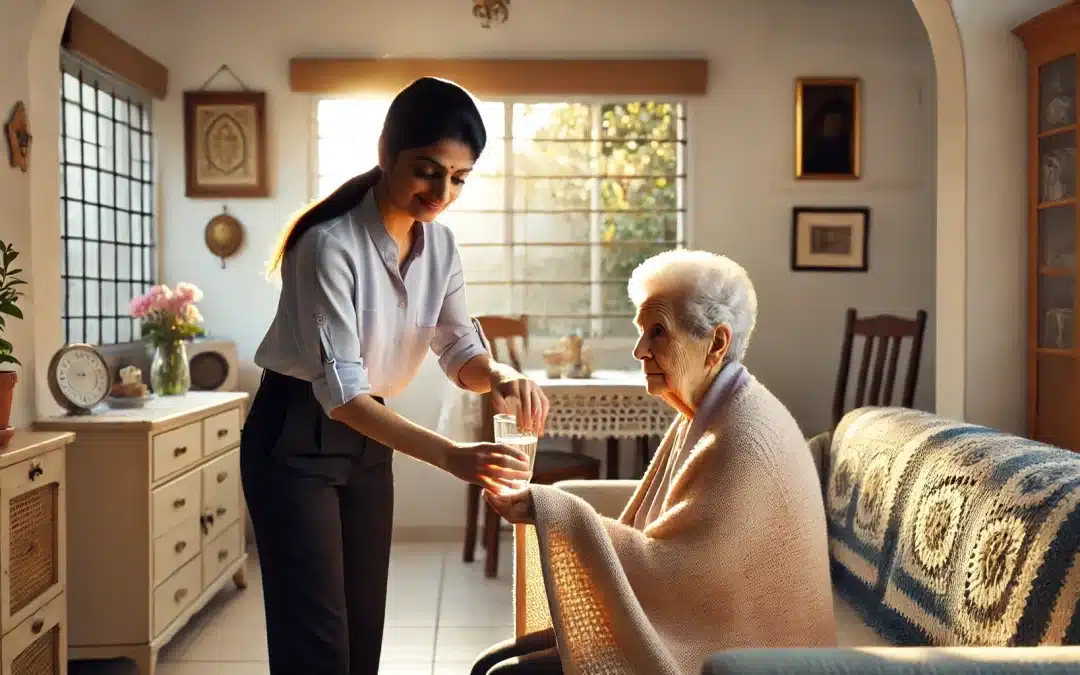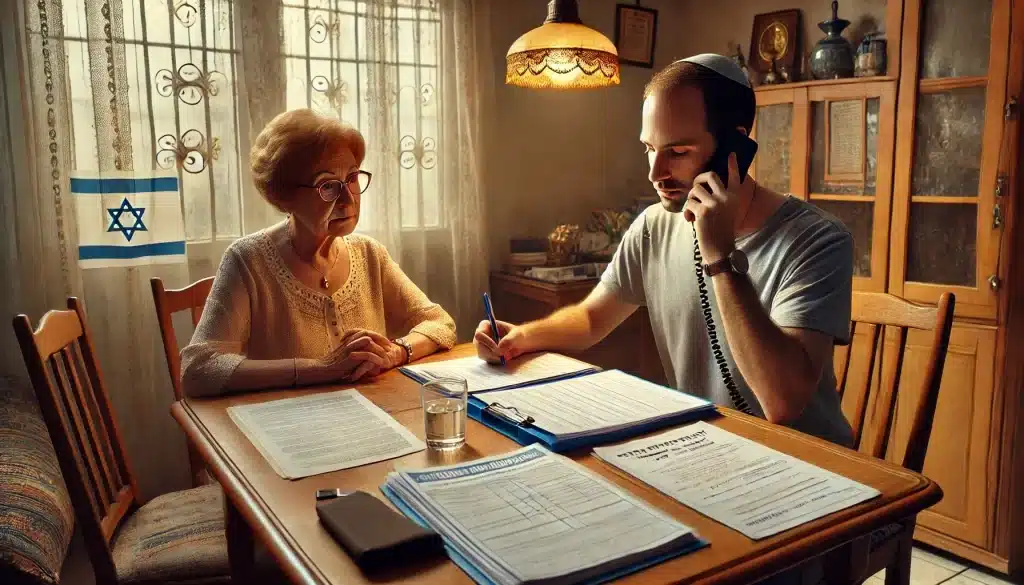
Jan 20, 2025
Having and managing a live-in caregiver for your elderly loved one is a significant life change that requires careful consideration and clear understanding of responsibilities. This guide, the final part in our three-part series on foreign caregivers in Israel, focuses on the essential aspects of maintaining a successful caregiving relationship after you’ve made your choice (Part 1) and completed the hiring process (Part 2).
To help you navigate this journey successfully, we’ve created a comprehensive Family Checklist for Managing a Foreign Caregiver that you can download, print, and use to track all necessary tasks – from initial setup through ongoing management (end of article). This checklist, combined with the detailed guidance in this article, will help ensure you don’t miss any crucial steps in managing your caregiving arrangement.
In this guide, we’ll walk you through everything you need to know about managing a foreign caregiver in Israel, from pre-arrival preparations to handling day-to-day situations and resolving potential conflicts. Whether you’re just starting this journey or looking to improve an existing caregiving arrangement, this guide provides the essential information and practical advice you need for long-term success.
Pre-Arrival Preparations: Setting the Foundation of Managing a Live-In Caregiver
Understanding Manpower Agencies (תאגידי כוח אדם)
According to Israeli law, every foreign caregiver must be registered with a licensed manpower agency. This requirement ensures proper oversight and protection for both the caregiver and the employing family.
Major licensed agencies in Israel include:
- A.B. Israeli Center for Caregivers (link)
- Ne’eman Foreign Workers for Nursing (link)
- M.S.D (Link)
A full list can be found in the following link
These agencies serve as the official mediator between the Population and Immigration Authority, the caregiver, and the employing family. Their services include:
- Assignment of a dedicated social worker who conducts mandatory periodic visits (1-2 times annually)
- Processing and renewal of work visas
- Handling required documentation with government authorities
- Providing guidance on legal rights and obligations
- Offering mediation services for conflict resolution
- Monitoring the caregiving situation to ensure compliance with regulations
Annual agency fees typically range from 2,000 to 2,500 NIS, which are paid by the employing family.
Medical Insurance and Healthcare Setup for Managing a Live-In Caregiver
Medical insurance is mandatory for foreign caregivers. According to Israeli law, the caregiver is legally responsible for paying this cost, which typically ranges from 120-180 NIS monthly. However, many families choose to cover this expense to ensure continuous and proper healthcare coverage, even though they are not legally obligated to do so.
Major providers include:
- Harel Insurance (through Shirbit)
- Menora Mivtachim
- Phoenix
Important Healthcare Tips:
- Register the caregiver with the same healthcare provider (קופת חולים), branch (סניף), and primary physician (רופא) as the senior
- This alignment significantly streamlines medical appointments and prescription management
- Ensures better coordination of care between the caregiver and healthcare providers
Basic insurance coverage includes:
- Emergency medical care
- Hospitalization
- Prescription medications
- Basic dental care
Communication Systems Setup
Effective communication requires proper infrastructure:
- Mobile Communication:
- Caregiver needs an Israeli phone number
- Cost responsibility lies with the caregiver
- Recommended providers: Golan Telecom, 019 Mobile, Partner
- Family Communication Framework:
- Create a dedicated WhatsApp group including: Primary family contacts, The caregiver, Healthcare providers when relevant
- Set clear communication guidelines
- Establish emergency contact protocols
Real-World Example: The Cohen family created a WhatsApp group named “Grandpa David Care” including their father’s caregiver and three adult children. They established rules for urgent messages (using the 🚨 emoji) versus routine updates, making communication efficient and clear for all parties involved. The group helps coordinate daily care activities, share updates about medical appointments, and ensure everyone stays informed about Grandpa David’s well-being.

Preparing Your Home and First Days Together
Creating a Welcoming Environment for Managing a Live-In Caregiver
The initial home setup is crucial for establishing a positive long-term caregiving relationship. Remember, your caregiver will be living in your loved one’s home 24/7, making their personal space essential for both comfort and work efficiency. A well-prepared, clean home with dedicated private space for the caregiver demonstrates respect and consideration, setting the foundation for a harmonious relationship.
Home Setup Requirements
Private Room Requirements:
- Clean, well-ventilated room with a window
- Bed and clean bedding
- Closet or wardrobe for personal belongings
- Small desk or table (recommended)
- Access to bathroom facilities
- Fan or air conditioning (especially important during summer)
- Basic lighting and electrical outlets
- Lock for privacy (if possible)
Shared Spaces Setup:
- Clear space in refrigerator for personal food items
- Kitchen storage space for personal belongings
- Access to laundry facilities
- House keys
- Written emergency contact list in clear view
- Basic household orientation guide
First Days Together – Building Relationships and Understanding
The initial days are critical not just for technical orientation but for building trust and understanding between all parties involved. This period sets the tone for the entire caregiving relationship. Take time to:
- Allow the caregiver and senior to get acquainted gradually
- Share family stories and photos to help the caregiver understand your loved one better
- Discuss preferences, habits, and daily routines
- Address any special care requirements openly
Special Care Considerations:
- For seniors with dementia:
- Explain specific behaviors and triggers
- Share successful communication techniques
- Provide detailed safety protocols
- Discuss wandering prevention strategies
- For seniors with physical limitations:
- Demonstrate proper transfer techniques
- Explain pain management routines
- Share exercise or therapy schedules
- Review mobility aid usage
Outside Orientation
Familiarize your caregiver with:
- Local grocery stores and supermarkets
- Nearest pharmacy
- Public transportation stops
- Senior clubs and community centers where seniors gather for activities
- Local parks or meeting places where both seniors and caregivers socialize
- Medical facilities (קופת חולים) location
- Nearby synagogue or place of worship (if relevant)
- Post office and other essential services
Real-World Example: “When Ana arrived, we spent the first morning walking around the neighborhood. We showed her the local Supersol where we usually shop, introduced her to the pharmacist at Super-Pharm who handles mom’s prescriptions, and showed her the local park where both seniors and caregivers often meet to chat and socialize. This orientation helped her feel more connected to the community and gave mom an opportunity to maintain her social connections.”

Managing Day-to-Day Care
Navigating the Initial Transition Period of Managing a Live-In Caregiver
The introduction of a live-in caregiver into a senior’s home marks a significant life change for everyone involved. For seniors receiving care for the first time, this transition can be particularly challenging as they grapple with feelings of lost independence and privacy concerns. Even those who have had previous caregivers may struggle, often comparing new caregivers to past ones or having preset expectations that may not align with reality.
Common Initial Challenges:
- Seniors feeling threatened by loss of independence
- Privacy adjustments and sharing living space
- Building trust between caregiver and senior
- Family members learning their new roles
- Establishing new daily routines
To ease this transition, maintain open dialogue and respect the senior’s need for control over certain aspects of their daily life. Remember that trust and comfort develop gradually – rushing this process rarely leads to positive outcomes.
Medical Care and Medication Management
One of the most critical aspects of senior care is proper medication management. While caregivers play a vital role in day-to-day care, the primary responsibility for medication management should typically rest with a designated family member.
Key Responsibilities: Family Member:
- Managing prescription schedules and renewals
- Communicating with healthcare providers
- Ensuring adequate medication supply
- Overseeing any changes in medication
Caregiver’s Role:
- Following established medication schedule
- Documenting each administration
- Reporting side effects or concerns
- Monitoring daily health changes
Financial Management
Managing finances in a caregiving relationship requires careful consideration and clear boundaries. As a general rule, caregivers should have minimal direct financial interactions with the senior. Instead, a designated family member should oversee all financial aspects of care.
Best Practices for Financial Management:
- Designate one family member as financial manager
- Establish clear purchasing protocols
- Keep detailed records of all expenses
- Maintain a small emergency fund for caregiver use
- Review receipts and expenses regularly
Real-World Example: “In our family, my brother handles the weekly grocery shopping, while I manage medical supplies and prescriptions. Our caregiver has access to a small emergency fund, but every purchase is documented with receipts that we review weekly. This system prevents any confusion or potential conflicts about money.”
Break Time and Rest Periods
While Israeli law mandates specific rest periods for caregivers, including a weekly 24-hour break, many caregivers prefer alternative arrangements such as shorter daily breaks. This flexibility can work well, but requires careful planning and monitoring.
Break Time Considerations:
- Assess senior’s ability to be alone safely
- Set clear break schedules and duration
- Establish check-in protocols
- Have emergency contacts readily available
- Monitor adherence to agreed schedules
For daily breaks (typically 2 hours), ensure:
- Break timing works with senior’s routine
- Senior has emergency contact means
- Clear start and end times are established
- Regular review of arrangement effectiveness
The key to successful break management is finding the right balance between caregiver needs and senior safety. Regular communication about these arrangements helps ensure they continue to work for everyone involved.

Understanding Legal Rights and Challenges of Managing a Live-In Caregiver
Employment Rights and Obligations
Foreign caregivers in Israel are protected by specific labor laws that establish their rights and working conditions. Understanding these regulations is crucial for maintaining a proper and legal employment relationship. While detailed salary calculations can be found in our salary calculation guide, here are the key elements you need to manage:
Basic Rights Overview:
- Monthly salary (as per current regulations)
- Weekly rest period (minimum 24 hours)
- Annual vacation days
- Sick leave
- Holiday allowance
- Pension contributions
- Recuperation pay (דמי הבראה)
Planning for Annual Vacation
Foreign caregivers typically take a one-month vacation annually, usually during summer, to visit their homeland. This extended break combines both paid annual leave and unpaid leave, as the standard annual vacation allowance doesn’t cover the entire month. The number of paid vacation days depends on the caregiver’s years of service (ותק):
- First year: 14 paid vacation days
- 2-3 years: 16 paid vacation days
- 4-5 years: 18 paid vacation days
- 6+ years: 21 paid vacation days
For example, if a caregiver who has worked for two years takes a month-long vacation (30 days), 16 days would be paid vacation days, while the remaining 14 days would be unpaid leave. This arrangement should be clearly documented in the employment contract and discussed in advance. The vacation requires careful advance planning, particularly regarding visa arrangements and finding a suitable temporary replacement (reliever).
Key Vacation Planning Considerations:
- Begin planning several months in advance
- Arrange return visa documentation
- Secure a reliable reliever caregiver
- Coordinate handover periods
While technically the responsibility for finding a reliever falls to the regular caregiver, in practice, this often becomes the family’s responsibility. Finding a suitable reliever can be challenging as they are typically foreign caregivers whose regular work permits have expired, making them highly sought after, especially during popular vacation periods.
Pro Tip: Consider engaging professional assistance, such as HappySeniors or similar care management services, to help secure a reliable reliever. Their expertise and connections can significantly reduce the stress of finding temporary coverage.
Managing Conflicts and Challenges
Caregiving relationships can face various challenges that require careful handling and professional intervention. Three primary sources of conflict often emerge:
- Misaligned Expectations: The gap between family expectations and caregiver duties can create tension. Clear communication about responsibilities, working hours, and care standards is essential from the start.
- Daily Living Conflicts: Living together 24/7 can strain relationships between seniors and caregivers. Seniors may exhibit challenging behaviors, especially those with conditions like dementia that can lead to verbal abuse or even violence. Conversely, caregivers might have strong personalities or different living habits that clash with the senior’s preferences.
- Fundamental Compatibility Issues: Sometimes, despite best efforts, there might simply be a poor fit between the caregiver and senior, requiring a change in caregiver.
The Importance of Professional Mediation for Managing a Live-In Caregiver
Many families find it challenging to handle caregiving conflicts effectively. With their own life pressures and limited time, they often hope the caregiving arrangement will be “fire-and-forget.” However, this approach can lead to deteriorating situations and increased stress for all parties.
While manpower agencies provide basic oversight, they typically don’t offer comprehensive conflict resolution services as part of their standard package. For this reason, engaging a private social worker or case manager can be invaluable. These professionals offer:
- Unbiased mediation
- Extensive experience in conflict resolution
- Regular monitoring of the caregiving relationship
- Professional intervention before situations escalate
- Practical solutions based on experience’
Real-World Example: “We initially tried handling conflicts with our caregiver directly, leading to tense confrontations and stress for everyone involved. After engaging a professional case manager, they helped resolve the issues by understanding both sides’ perspectives and implementing practical solutions. Their calm, professional approach transformed what had been a deteriorating situation into a stable, positive caregiving relationship.”
Support Resources
Several professional resources are available for managing caregiver relationships:
- Private Case Managers/Social Workers
- Provide ongoing monitoring and support
- Offer professional conflict resolution
- Help maintain stable caregiving relationships
- Kav LaOved (קו לעובד)
- Phone: 03-6883766
- Workers’ rights guidance and support
- Ministry of Labor (משרד העבודה)
- Official oversight and regulations
- Labor law compliance guidance
Remember that investing in professional case management services can prevent many common caregiving challenges and provide peace of mind for both families and caregivers.

Keys to Long-term Success for Managing a Live-In Caregiver
Building a Sustainable Care Environment
Creating a successful long-term caregiving relationship requires ongoing attention and proactive management. This final section of our guide focuses on essential practices that help maintain a stable and positive caregiving environment.
Regular Review and Assessment
Schedule periodic evaluations of the caregiving arrangement to ensure it continues meeting everyone’s needs. Monthly family meetings can help address concerns before they become problems and maintain clear communication channels between all parties.
Key Review Areas:
- Senior’s health status and changing needs
- Caregiver’s wellbeing and job satisfaction
- Care plan effectiveness
- Communication effectiveness
- Required adjustments to routines or responsibilities
Professional Support Network for Managing a Live-In Caregiver
Maintaining a strong professional support network is crucial for long-term success. This network should include:
- Primary Care Physician
- Case Manager/Social Worker
- Specialist Healthcare Providers
- Support Groups (for both family and caregiver)
- Emergency Backup Caregivers
- Agency Contacts
Maintaining Healthy Boundaries
Long-term caregiving relationships often become quite personal, making it important to maintain appropriate professional boundaries while still fostering a caring environment.
Best Practices:
- Keep roles and responsibilities clear
- Maintain consistent work schedules
- Respect private time and space
- Address issues promptly and professionally
- Document important decisions and changes
Real-World Example: “After three years with our caregiver, we’ve learned that regular monthly meetings with our case manager help maintain a balanced relationship. We discuss any concerns openly, adjust care plans as needed, and ensure everyone’s needs are being met. This proactive approach has helped us avoid many potential problems.”
Signs That Changes May Be Needed
Be alert to signs that the current caregiving arrangement may need adjustment:
Warning Signs:
- Declining care quality
- Increased conflicts or tension
- Changes in senior’s health needs
- Caregiver burnout symptoms
- Communication breakdowns
Final Recommendations for Managing a Live-In Caregiver
Based on our experience helping numerous families manage their caregiving relationships, we recommend:
- Stay Proactive: Don’t wait for problems to emerge before seeking support or making adjustments.
- Invest in Professional Support: The cost of professional case management is often far less than the expense and stress of frequent caregiver changes or crisis management.
- Maintain Clear Documentation: Keep records of schedules, agreements, and any changes to the care plan.
- Focus on Prevention Regular: check-ins and open communication can prevent many common caregiving challenges.
- Value the Relationship: Remember that a positive caregiving relationship benefits everyone – the senior, the family, and the caregiver.
Conclusion
Managing a live-in caregiver relationship successfully requires dedication, clear communication, and proper support systems. While it may seem overwhelming at first, following the guidelines in this series of articles can help you create and maintain a stable, positive caregiving environment that benefits everyone involved.
Remember that you’re not alone in this journey. Professional support is available and can make a significant difference in the success of your caregiving arrangement. For more information about managing foreign caregivers in Israel, contact HappySeniors for professional guidance and support.
Professional Support for Your Managing a Live-In Caregiver Journey
Managing a caregiving relationship is a complex and ongoing process that requires attention, understanding, and often professional guidance. As we’ve seen throughout this series of articles, various challenges can arise at different stages of the caregiving journey – from initial setup to daily management and conflict resolution.
HappySeniors’ professional case management services can help you navigate these challenges effectively. Our experienced social workers provide comprehensive support, ensuring that both your loved one and their caregiver maintain a positive and productive relationship. We understand that each family’s situation is unique, and we tailor our support accordingly.
Our case management services include:
- Regular monitoring and assessment of the caregiving relationship
- Professional mediation and conflict resolution when needed
- Guidance with administrative and bureaucratic requirements
- Assistance in finding suitable replacement caregivers during vacations
- Ongoing support for both families and caregivers
We invite you to contact us for professional guidance and support:
Remember that investing in professional case management can prevent many common caregiving challenges and provide peace of mind for everyone involved in the caregiving relationship.
Family Checklist for Managing a Live-In Caregiver
Initial Setup (Before Caregiver Arrival)

Dec 3, 2024
Hiring a live-in caregiver from abroad (“foreign caregiver”) is a significant decision that can profoundly impact your family’s life. For families in Israel, this process involves unique cultural, legal, and logistical considerations. Our guide is specifically tailored to assist Israeli families considering hiring a live-in caregiver for their loved ones.
This guide is the first in a three-part series designed to assist you through each stage of this journey of hiring a Live-in caregiver:
- Initial Decision and Preparation: Understanding the need and preparing for Hiring a Live-in Caregiver.
- Recruitment Process: Finding, interviewing, and hiring the right caregiver.
- Maintenance and Support: Ensuring a successful long-term caregiving relationship.
Our aim is to provide practical advice while addressing the emotional and logistical challenges you may face during the initial decision-making process.
Key Insight: A successful caregiving arrangement isn’t just about finding someone to provide physical assistance—it’s about creating a supportive environment that enhances your loved one’s quality of life while providing peace of mind for the entire family.
Having the Conversation
Understanding Your Loved One’s Perspective
Approaching the topic of introducing a live-in caregiver into your loved one’s home can be delicate and challenging. It’s essential to recognize the emotions and concerns they may have about this significant change. Understanding their perspective allows you to address their fears compassionately and thoughtfully.
Key concerns your loved one may have in Hiring a Live-in Caregiver include:
- Expectations that family members will provide care: They may have always believed that their spouse or children would be the ones to support them, making the idea of outside help seem unnecessary or even like a personal rejection.
- Fears of losing independence and privacy: Inviting someone new into their personal space can feel intrusive, leading to anxiety about losing control over their daily routines and personal decisions.
- Concerns about communication barriers with a non-local caregiver: Worries about language differences and cultural misunderstandings might make them hesitant, fearing they won’t be able to express their needs effectively.
- Cultural expectations regarding family care responsibilities: Cultural or societal norms may emphasize that family members should provide care, making external assistance seem inappropriate or stigmatized.
- Cognitive decline making change particularly frightening: For seniors experiencing cognitive issues or dementia, any change can be confusing and frightening, intensifying resistance to new arrangements.
By acknowledging these concerns, you demonstrate respect for their feelings and create an opportunity for open dialogue.
Key Insight: Understanding your loved one’s fears and expectations is crucial in approaching the conversation about care. Empathy and patience lay the foundation for a supportive discussion that can lead to a mutually agreeable solution.
With this understanding, you can now employ effective communication strategies to address their concerns thoughtfully. In the next section, we’ll explore practical approaches to facilitate this important conversation.
Effective Communication Strategies
Approaching the conversation with empathy and clarity can make a significant difference in how your loved one receives the idea of a live-in caregiver. Here are specific strategies to facilitate a constructive dialogue:
- Express Your Limitations Compassionately Ans Stress Your Inability to Provide 24/7 Care: Gently explain that due to work commitments, caring for your own children, or other responsibilities, you are unable to be present around the clock.
- Example Script: “Dad, I wish I could be here with you all the time, but with my job and the kids needing my attention, I can’t provide the constant care you deserve.”
- Reassure Your Continued Support Promise That You Are Not Leaving Them: Emphasize that Hiring a Live-in Caregiver doesn’t mean you’re abandoning them. Assure them that you will continue to visit regularly and remain actively involved in their life.
- Example Script: “Having someone here to help doesn’t change how much I love you. I’ll still come by every day after work to spend time together.”
- Choose the Right Moment and Setting Find a calm, comfortable environment free from distractions to have the conversation. This could be during a quiet afternoon at home or while enjoying a favorite activity together.
- Express Empathy and Concern: Begin by expressing your love and desire for their well-being.
- Example Script: “Mom, your happiness and health are so important to me. I want to make sure you have all the support you need.”
- Highlight the Benefits: Emphasize how a caregiver can enhance their quality of life by assisting with daily tasks, providing companionship, and allowing them to continue enjoying their hobbies and routines.
- Example Script: “With some extra help around the house, you can spend more time doing the things you love without worrying about the harder tasks.”
- Involve Them in the Decision-Making Process: Encourage their participation in selecting the caregiver to ensure they feel included and respected.
- Example Script: “Let’s look at some caregiver profiles together and see who might be a good fit for you.”
- Share Personal Stories and Positive Examples: Relate experiences of friends or relatives who have had positive outcomes with live-in caregivers.
- Example: “Remember Aunt Leah? She was hesitant at first, but now she and her caregiver have become close friends.”
- Offer a Trial Period: Suggest starting with a short-term arrangement to see how it works, reducing the pressure of a long-term commitment.
- Example Script: “What if we try having someone help out for a few weeks and see how you feel about it?”
- Address Communication and Cultural Concerns: Reassure them that many caregivers are eager to learn Hebrew and that you can help bridge any language or cultural gaps together.
- Example Script: “We can find someone who is learning Hebrew, and we’ll all work together to make communication easy.”
- Acknowledge Their Fears and Listen Actively: Allow them to express their concerns without interruption. Validate their feelings by acknowledging their fears and showing understanding.
- Example Script: “I understand that this is a big change, and it’s okay to feel unsure. Let’s talk about what’s worrying you.”
Key Insights:
- It’s a Process, Not a One-Time Conversation: Recognize that accepting the need for a live-in caregiver is a significant change for your loved one. They may need time to process the idea, so be prepared for multiple discussions over days or even weeks. Patience is essential as they adjust to the new reality.
- Let the Idea “Cook”: Introduce the concept gently and allow your loved one time to reflect on it. Rushing the decision may lead to resistance. By giving them space, you’re showing respect for their autonomy and helping them come to terms with the change at their own pace.
By employing these strategies and understanding that this conversation may unfold over time, you can create a supportive environment where your loved one feels heard, respected, and involved in the decision-making process. This thoughtful approach paves the way for a smoother transition to having a live-in caregiver.
Understanding Your Care Options
Now that you’ve begun the conversation with your loved one and are giving them time to adjust to the idea of additional support, it’s important to explore all the care options available. Understanding these options will help you make an informed decision that best suits your loved one’s needs and preferences, as well as the family’s capabilities.
Key Decision Point: While several care options exist, hiring a live-in caregiver from abroad can offer a comprehensive solution for seniors requiring round-the-clock care while maintaining their home environment. By evaluating all available options, you can determine whether this choice aligns with your loved one’s needs and your family’s circumstances.
Overview of Care Options
- Family Caregiving
- Israeli Part-Time Caregivers
- Nursing Homes
- Live-in Caregiver from Abroad
Let’s delve into each option to understand their advantages and challenges.
1. Family Caregiving
Advantages:
- Emotional Comfort: Care is provided by loved ones who have a deep understanding of the senior’s preferences and habits.
- No Language or Cultural Barriers: Communication is seamless, and cultural practices are shared.
- Cost Savings: Financial expenses are minimized compared to Hiring a Live-in Caregiver professional.
Challenges:
- Physical and Emotional Burnout: Family members may experience stress and fatigue, affecting their health and relationships.
- Impact on Personal Lives: Balancing caregiving with work, raising children, and other responsibilities can be overwhelming.
- Lack of Professional Training: Family members may not have the necessary skills to handle medical or specialized care needs.
- Unsustainable Long-Term: Providing 24/7 care can become impractical over time.
2. Israeli Part-Time Caregivers
Advantages:
- Professional Assistance: Caregivers are trained and experienced in providing elder care.
- Cultural Familiarity: Shared language and cultural practices ease communication and understanding.
- Flexible Hours: Care can be scheduled according to specific needs.
Challenges:
- High Cost: Hourly rates can accumulate quickly, making it an expensive option for extensive care.
- Limited Availability: Scheduling conflicts may arise, leading to coverage gaps.
- Multiple Caregivers: May require coordinating with more than one caregiver to cover all needed hours, leading to inconsistency.
3. Nursing Homes
Advantages:
- Comprehensive Care: Access to 24/7 medical supervision and assistance.
- Structured Environment: Provides routines and activities designed for seniors.
- Social Interaction: Opportunities to engage with other residents.
Challenges:
- Loss of Familiar Environment: Moving away from home can be distressing.
- Less Personalized Attention: Staff may have limited time for one-on-one interaction.
- High Cost: Often the most expensive option.
- Emotional Impact: Feelings of abandonment or isolation may occur.
4.Hiring a Live-in Caregiver from Abroad
Advantages:
- Aging in Place: Allows your loved one to stay in the comfort of their own home.
- Consistent Care: One caregiver provides continuous support, fostering a strong relationship.
- Cost-Effective for 24/7 Care: More affordable than round-the-clock hourly care.
- Personalized Assistance: Care can be tailored to the senior’s specific needs and routines.
- Cultural Enrichment: Opportunity for mutual cultural exchange and learning.
Challenges:
- Language and Cultural Adaptation: Initial communication barriers may exist, requiring patience and effort from both parties.
- Living Space Requirements: Accommodations must be made in the home for the caregiver.
- Employment Management: Legal responsibilities as an employer, including contracts and adherence to labor laws.
- Adjustment Period: Time needed for both the caregiver and senior to adapt to each other.
Care Options Comparison Table
| Care Option |
Best For |
Cost Level |
Level of Care |
Impact on Senior’s Life |
Family Involvement Required |
| Family Caregiving |
Short-term or partial care needs |
Low financial cost, high personal cost |
Variable, limited by availability |
Minimal disruption to routine |
Very High – significant commitment |
| Israeli Part-Time Caregivers |
Independent seniors needing specific-time assistance |
High hourly cost |
Professional but time-limited |
Moderate adjustment needed |
Moderate – scheduling and oversight |
| Nursing Home |
Complex medical needs requiring constant supervision |
Highest |
Comprehensive medical care |
Complete lifestyle change |
Low – mainly administrative |
| Hiring Live-in Caregiver from Abroad |
Long-term comprehensive care at home |
Moderate-High, cost-effective for 24/7 care |
Comprehensive personal care |
Maintains home environment with adaptation |
Moderate – management and support |
Key Insight: Each care option has its unique benefits and challenges. It’s essential to weigh these factors against your loved one’s needs, preferences, and the family’s capacity to provide support. Openly discussing these options with your loved one can help them feel involved and respected in the decision-making process.
Transitioning to the Preferred Option
After reviewing all options, you might find that hiring a live-in caregiver from abroad offers the best balance of comprehensive care and maintaining your loved one’s quality of life. Involving your loved one in this evaluation reinforces their autonomy and can ease the transition.
In the next section, we’ll explore how to find the right caregiver, ensuring a successful match that meets both your loved one’s needs and the caregiver’s abilities.
Finding the Right Caregiver
Selecting the right caregiver is not just a step in the process—it’s the cornerstone upon which the entire caregiving experience is built. This decision will significantly impact your loved one’s quality of life, your family’s peace of mind, and the overall success of the care arrangement. The caregiver you choose will become an integral part of your loved one’s daily routine, providing not only physical assistance but also emotional support and companionship. Therefore, finding the right match is absolutely crucial.
A well-matched caregiver can enhance your loved one’s well-being, foster a positive relationship, and ensure a smooth integration into your family life. Conversely, a poor match can lead to discomfort, stress, and the disruption of care, necessitating the arduous process of finding a replacement. The stakes are high, and careful consideration is essential.
Exploring Caregiver Source Options
When searching for a live-in caregiver, you generally have two primary options:
- Bringing a New Caregiver from Abroad
- Hiring an Experienced Caregiver Already in Israel
Each option has its advantages and challenges. Understanding these can help you make an informed decision that best suits your loved one’s needs.
Caregiver Source Options Comparison
| Aspect |
New Caregiver from Abroad |
Experienced Caregiver in Israel |
| Initial Cost |
Higher (visa, travel, agency fees) |
Lower (local transfer fees) |
| Experience Level |
Limited/None in Israeli context |
Proven track record locally |
| Adaptation Period |
Longer (3-6 months) |
Shorter (1-2 months) |
| Flexibility |
Generally more adaptable |
May have set working styles |
| Salary Expectations |
Initially lower |
Generally higher |
| Risk Level |
Higher (unknown performance) |
Lower (verifiable references) |
| Language Skills |
Usually minimal Hebrew |
Basic Hebrew common |
| Cultural Understanding |
Limited |
Established |
Detailed Analysis of Each Option
1. Bringing a New Caregiver from Abroad
Best When:
- Your loved one is still relatively independent and can participate in the adaptation process.
- The family has time to invest in training and helping the caregiver adjust.
- Lower ongoing costs are a priority.
- You desire a caregiver who can grow into the role and potentially stay long-term.
- Flexibility and adaptability are valued over immediate experience.
Considerations:
- Adaptation Period: Expect a longer adjustment phase as the caregiver acclimates to a new country, culture, and your family’s routines.
- Training Needs: Additional time and effort will be required to train the caregiver in specific care tasks and household expectations.
- Language Barrier: Communication may be challenging initially; patience and support will be necessary.
- Unknown Performance: Without prior experience in Israel, assessing their capabilities relies on overseas references and interviews.
Advantages:
- Flexibility: New caregivers may be more open to adapting to your loved one’s specific needs and preferences.
- Long-Term Potential: They may be more likely to commit to a longer stay, providing continuity of care.
- Cost Savings Over Time: While initial costs are higher, ongoing salary expectations may be lower.
2. Hiring an Experienced Caregiver in Israel
Best When:
- Immediate skilled care is required due to complex medical needs.
- Quick adaptation is necessary, and there’s less time available for training.
- Communication in Hebrew is important for your loved one’s comfort.
- You prefer a caregiver with a proven track record and verifiable local references.
Considerations:
- Higher Salary Expectations: Experienced caregivers may command higher wages due to their expertise.
- Established Work Habits: They may have set ways of working, which could require negotiation to align with your family’s preferences.
- Availability: Finding an available experienced caregiver may be challenging due to demand.
- Shorter Commitment: They may prefer shorter contracts or have other obligations that limit long-term availability.
Advantages:
- Quick Integration: Familiarity with Israeli culture and systems allows for a smoother transition.
- Proven Skills: Their experience provides confidence in their ability to handle care responsibilities effectively.
- Language Proficiency: Better communication can enhance the relationship with your loved one.
Key Insights:
- Assess Your Priorities: Determine what factors are most important—be it immediate experience, cost considerations, long-term commitment, or adaptability.
- Involve Your Loved One: Their comfort and preferences should guide the decision, especially regarding language and personality fit.
- Consider Timing: If you have the luxury of time, bringing a caregiver from abroad might be feasible. If urgent care is needed, an experienced local caregiver may be the better option.
- Weigh Risks and Benefits:Each option carries its own risks and potential rewards. Balancing these against your family’s needs will help in making the right choice.
Finding the right caregiver goes beyond choosing between these two options. It’s about ensuring compatibility on multiple levels—physical needs, communication, cultural fit, and emotional connection. In the next section, we’ll delve into The Matching Process, where we’ll explore how to evaluate these factors in depth, conduct effective interviews, and utilize professional support to find the caregiver who is the best fit for your loved one and family.

The Matching Process in Hiring a Live-in Caregiver
Just as selecting the right caregiver is crucial, the matching process itself is where the foundation for a successful caregiving relationship is truly established. This stage isn’t merely about ticking boxes on a checklist; it’s about finding a caregiver whose skills, personality, and values align seamlessly with your loved one’s needs and preferences. A thoughtful and thorough matching process can significantly enhance the quality of care and the overall experience for everyone involved.
Why It Matters: Even the most qualified caregiver may not be the right fit if there’s a mismatch in personality, communication style, or cultural understanding. A poor match can lead to discomfort, misunderstandings, and ultimately, a breakdown in the caregiving relationship. This not only affects your loved one’s well-being but also results in additional stress and potential financial costs for the family as the search begins anew. Investing time and effort in this process helps prevent future issues, promotes harmony, and contributes to the overall success of the care arrangement.
Key Considerations
When matching a caregiver to your loved one, consider the following areas:
- Physical and Medical Needs
| Factor |
Considerations |
| Health Conditions |
Dementia, Parkinson’s, diabetes, dialysis requirements, or other illnesses requiring specialized care |
| Mobility Level |
Ability to walk independently, use of wheelchair or mobility aids, need for transfers between bed and chair |
| Continence Care |
Assistance with toileting, use of diapers, ability to control bladder and bowel movements |
| Daily Activities |
Tasks the senior can perform independently vs. those needing assistance (e.g., bathing, dressing, eating) |
| Left Alone |
Whether the senior can be safely left alone for short periods or requires constant supervision |
| Mental State |
Cognitive abilities, memory issues, mood disorders, need for mental stimulation or companionship |
- Lifestyle and Habits
| Factor |
Considerations |
| Living Situation |
Whether the senior lives alone, with a spouse, family member, or has pets in the home |
| Smoking Habits |
If the senior or caregiver smokes, and if this affects compatibility |
| Dietary Preferences |
Special diets, food restrictions, kosher kitchen requirements |
| Sleep Patterns |
Senior’s sleep schedule, need for nighttime assistance |
| Hygiene Practices |
Bathing frequency, grooming preferences |
| Religious Observance |
Sabbath observance, holiday practices, need for caregiver to respect or participate |
- Communication and Cultural Compatibility
| Factor |
Considerations |
| Language Skills |
Need for Hebrew, English, or other language proficiency |
| Cultural Sensitivity |
Understanding and respecting cultural norms and practices |
| Communication Style |
Preferences for formal or informal interaction, patience, clarity |
- Family Expectations and Caregiver Understanding
| Factor |
Considerations |
| Task Expectations |
Clarity on tasks the caregiver is expected to perform (e.g., cooking, cleaning, medical assistance) |
| Caregiver’s Experience |
Previous experience with specific conditions (e.g., dementia, Parkinson’s) |
| Boundaries |
Defining personal space, privacy, and professional boundaries |
| Flexibility |
Ability to adapt to changing needs or schedules |
Steps in the Matching Process when Hiring a Live-in Caregiver
- Assess Needs Thoroughly
- Document all physical, medical, and emotional needs of the senior.
- Note any specific skills required, such as experience with certain medical equipment or conditions.
- Define Caregiver Criteria
- Create a detailed list of qualifications and personal attributes desired in a caregiver.
- Prioritize essential factors over those that are preferred but not critical.
- Screen and Interview Candidates
- Use reputable agencies to find candidates.
- Prepare questions that address all key considerations.
- Include the senior in interviews when possible.
- Evaluate Compatibility
- Observe interactions between the senior and caregiver.
- Ensure mutual understanding of expectations and responsibilities.
- Discuss lifestyle and habit compatibility.
- Check References and Background
- Verify experience, especially with relevant medical conditions.
- Conduct background checks for safety
Key Insights
- The Process Is More Than a Job Interview: You’re not just hiring an employee; you’re selecting someone who will be a daily companion and caregiver to your loved one. Trust is paramount, and the caregiver will become an integral part of your family’s life. The emotional and physical well-being of your loved one depends on this relationship.
- Invest in the Selection Process: Dedicate substantial time and resources to evaluate candidates thoroughly. Conduct in-depth interviews, observe interactions with your loved one, and perform comprehensive background and reference checks. This investment helps ensure safety, compatibility, and peace of mind.
- Professional Assistance Is Highly Recommended: Engaging a social worker or professional case manager can greatly enhance the matching process. These professionals bring expertise in assessing needs, understanding family dynamics, and evaluating caregiver qualifications. Their guidance can help you navigate complex considerations and make informed decisions.
By carefully considering these factors and utilizing available resources, you increase the likelihood of finding a caregiver who not only meets the practical needs but also fits well with your loved one’s personality and lifestyle. This thoughtful approach lays the foundation for a successful and harmonious caregiving relationship.
Cultural Integration and Mutual Respect, hiring a Live-in caregiver
With a well-matched caregiver selected, the next crucial step is integrating them into your loved one’s daily life and home environment. This integration goes beyond logistical arrangements; it involves building a relationship founded on cultural understanding and mutual respect. Since the caregiver is from abroad, addressing cultural differences proactively can enhance the caregiving experience for everyone involved.
Importance of Cultural Integration
- Enhances Communication: Understanding each other’s cultural backgrounds improves mutual understanding and reduces misinterpretations.
- Builds Trust and Respect: Recognizing and valuing each other’s customs fosters a positive and respectful relationship.
- Creates a Harmonious Environment: A culturally sensitive approach promotes comfort and satisfaction for both the caregiver and your loved one.
Strategies for Cultural Integration
- Open Dialogue
- Share Cultural Practices: Encourage both the caregiver and your loved one to share their traditions, holidays, and customs.
- Discuss Expectations: Clearly communicate daily routines, religious observances, and any household norms.
- Example: Have a family meeting to introduce the caregiver to your traditions and invite them to share theirs.
- Language Support
- Language Learning: Provide resources for the caregiver to learn basic Hebrew, and consider learning simple phrases in their native language.
- Use of Translation Tools: Utilize apps or devices to aid communication during the initial adjustment period.
- Respect for Religious Observances
- Explain Religious Practices: Inform the caregiver about any religious customs, such as observing Shabbat or dietary laws like keeping kosher.
- Accommodate Differences: Encourage mutual respect for differing religious beliefs and practices.
- Shared Activities
- Cultural Exchange: Engage in activities that allow for sharing cultures, such as cooking traditional meals together or celebrating festivals.
- Include Them in Appropriate Family Events: Involve the caregiver in family gatherings where appropriate to foster a sense of belonging.
- Set Clear Boundaries
- Define Roles and Responsibilities: Clearly outline the caregiver’s duties to prevent misunderstandings.
- Respect Privacy: Discuss personal space and privacy needs to ensure comfort for both parties.
- Provide Support
- Offer Resources: Help the caregiver access community resources, support groups, or cultural organizations.
- Regular Check-ins: Schedule times to discuss how things are going and address any concerns.
Key Insight:
Mutual Respect Enhances Care Quality. By embracing cultural differences and fostering mutual respect, you create a supportive environment where both your loved one and the caregiver feel valued and understood. This positive relationship not only makes daily interactions more pleasant but also contributes to better overall care, as the caregiver is more engaged and your loved one feels more comfortable and secure.
Integrating the caregiver culturally is a vital continuation of the matching process. While finding a caregiver whose skills and personality align with your loved one’s needs is essential, ensuring they can coexist harmoniously within your family’s cultural context is equally important. This integration fosters trust, reduces potential conflicts, and lays the groundwork for a successful, long-term caregiving relationship.

Resources and Support Hiring a Live-in Caregiver
As you navigate the journey of hiring a live-in caregiver from abroad, it’s essential to leverage the resources and support networks available to you. These resources can provide guidance, assist with legal and administrative tasks, and offer emotional support throughout the process.
| Resource |
Description |
Contact Information |
| Population and Immigration Authority |
Handles visas and work permits for foreign caregivers |
Phone: *3450
Website: www.piba.gov.il |
| National Insurance Institute (Bituach Leumi) |
Provides information on benefits, entitlements, and employer obligations |
Phone: *6050
Website: www.btl.gov.il |
| Ministry of Labor, Social Affairs and Social Services |
Offers guidance on elder care programs, legal rights, and employment standards |
Phone: 118
Website:
https://www.gov.il/en/departments/molsa/govil-landing-page |
| Hotline for Workers’ Rights |
Provides assistance on employment rights and obligations |
Phone: 1-800-354-354
Website: www.kavlaoved.org.il |
| Licensed Caregiver Placement Agencies |
Professional agencies specializing in matching families with qualified caregivers |
Note: Ensure the agency is licensed by the Ministry of Labor. A list of licensed agencies can be found on the ministry’s website or by contacting them directly. |
| Legal Aid Department (Ministry of Justice) |
Offers legal assistance regarding employment contracts and rights |
Phone: 1-700-70-60-44
Website: www.justice.gov.il |
| Elder Support Organizations |
Provide resources, support, and activities for seniors and their families |
Examples:
– Yad Sarah
Phone: *6444
Website: https://yadsarah.org/
– JDC-Eshel
Website: www.eshelnet.org.il |
Conclusion
Embarking on a Transformative Journey: Hiring a live-in caregiver from abroad is a significant undertaking that requires careful consideration, planning, and compassion. Throughout this guide, we’ve explored the essential steps and considerations to help you make informed decisions tailored to your loved one’s needs and your family’s circumstances.
Key Steps Recap:
- Open Communication: Engage in honest and empathetic conversations with your loved one, allowing them time to adjust to the idea of additional support.
- Explore Care Options: Evaluate all available care options to determine the best fit for your loved one’s needs and preferences.
- Careful Selection: Invest time in the matching process to find a caregiver who aligns with your loved one’s physical needs, personality, and lifestyle.
- Cultural Integration: Foster mutual respect and understanding to create a harmonious living environment that benefits both your loved one and the caregiver.
- Utilize Resources: Leverage specific government, professional, and community resources to navigate legal requirements and access support.
Final Key Insight
A Thoughtful Approach Leads to Lasting Benefits: By approaching this journey of Hiring a Live-in Caregiver with diligence, empathy, and open-mindedness, you set the stage for a successful caregiving relationship that can significantly enhance your loved one’s quality of life. The effort invested now lays the foundation for peace of mind, comfort, and well-being in the years to come.
Moving Forward Hiring a Live-in Caregiver
This guide is the first in a three-part series designed to support you through every stage of hiring and working with a live-in caregiver from abroad. In the next articles, we will delve deeper into:
- The Recruitment Process: Practical steps for finding, interviewing, and hiring the right caregiver, including legal and ethical considerations.
- Maintenance and Support: Strategies for nurturing a positive long-term relationship with the caregiver, addressing challenges, and ensuring ongoing satisfaction.
Remember: You’re not alone in this process. Support is available every step of the way to help you make the best choices for your loved one and your family.
How “Happy Seniors” Can Assist You Hiring a Live-in Caregiver
Navigating the complexities of hiring a live-in caregiver from abroad can be challenging for families and seniors alike. At Happy Seniors, we are dedicated to easing this burden by providing comprehensive support and professional case management. Our experienced social workers are here to guide you through every step, helping you secure the best funding and care options available.
Our Services Include:
- Personalized Case Management: Tailored assistance to meet your family’s unique needs.
- Funding Assistance: Guidance in obtaining government funding for elderly care.
- Emotional Support: Providing compassionate support to families during this transition.
- Care Setting Consultation: Helping you find the most suitable care environment for your loved one.
Contact Us:
At Happy Seniors, our mission is to ensure that your loved ones receive the highest quality care in the most appropriate environment, along with the financial assistance they deserve. Let us help you navigate this journey with confidence and peace of mind.

Nov 9, 2024
Sarah sat across from her mother’s neurologist at Ichilov Hospital, trying to process what she just heard. Her mother, once a vibrant retired teacher from Haifa, was showing significant signs of cognitive decline. “You should consider applying for guardianship through Beit Mishpat,” the doctor suggested gently. Sarah felt overwhelmed – what exactly would this mean under Israeli law, and how would it affect both their lives?
If you find yourself in a similar situation, this guide will help you understand guardianship in Israel, its importance, and the responsibilities it entails. This article builds upon our previous guide about the guardianship application process in Israel.
What is Guardianship in Israel?
Under Israeli law (The Legal Capacity and Guardianship Law 5722-1962), guardianship (אפוטרופסות) is a legal arrangement where the court (Beit Mishpat) appoints a person or corporation to make decisions for another person who is unable to make sound decisions about their health, safety, or property. In Israel, this typically applies to:
- Elderly individuals with cognitive decline
- Adults with disabilities
- Minors in certain circumstances
- Individuals unable to manage their affairs
Why is Guardianship Important in the Israeli Context?
The Israeli legal system places strong emphasis on protecting vulnerable individuals while preserving their dignity and rights. Guardianship serves several crucial purposes within this framework:
- Legal Protection: Provides legal authority recognized by all Israeli institutions
- Healthcare Access: Enables interaction with Kupot Holim (Israeli HMOs) and hospitals
- Financial Management: Allows handling of National Insurance Institute (Bituach Leumi) benefits and other financial matters
- Property Protection: Ensures proper management of assets under Israeli law
- Social Services: Facilitates access to Israeli social services and benefits
Signs That Indicate the Need for a Guardianship in Israel
Consider David’s case: his daughter Marina noticed he was repeatedly forgetting to pay his Arnona (municipal tax), leaving food burning on the stove, and making unusual withdrawals from his bank account. These are common signs that might indicate the need for guardianship. Key indicators include:
Medical/Personal Care Signs:
- Inability to communicate effectively with medical staff at Kupat Holim
- Consistent neglect of personal hygiene
- Failure to take necessary medications
- Inability to maintain a safe living environment
Financial/Property Signs:
- Making poor financial decisions
- Becoming victim to scams (unfortunately common among Israeli seniors)
- Inability to manage basic bill payments (Arnona, utilities, etc.)
- Significant changes in spending patterns

Types of Guardianship in Israel
Under Israeli law, there are two main types of guardianship:
1. Guardian of the Person (אפוטרופוס לגוף)
Responsibilities include:
- Making healthcare decisions within the Israeli healthcare system
- Ensuring proper living arrangements
- Coordinating with Kupot Holim and hospitals
- Making decisions about social activities and lifestyle choices
- Working with Israeli social services when needed
2. Guardian of Property (אפוטרופוס לרכוש)
Responsibilities include:
- Managing bank accounts and investments in Israel
- Paying bills and taxes (including Arnona, income tax, etc.)
- Maintaining property and insurance
- Managing pension and Bituach Leumi benefits
- Filing required reports with the Israeli Administrator General (האפוטרופוס הכללי)
Implementing Guardianship Responsibilities in Israel
For Guardian of the Person:
- Create a Care Plan
- Coordinate with Israeli healthcare providers
- Arrange necessary medical care through Kupat Holim
- Establish daily care routines
- Plan for future care needs within the Israeli healthcare system
- Coordinate Care Services
- Work with Israeli healthcare providers
- Arrange for in-home care (metaplot) if needed
- Schedule regular medical check-ups
- Monitor medication management
- Maintain Documentation
- Keep medical records from Israeli healthcare providers
- Document important decisions
- Maintain communication records with healthcare providers
- Keep copies of all legal documents
For Guardian of Property:
- Initial Assessment
- Create inventory of assets as required by the Administrator General
- Review existing bills and obligations
- Identify sources of income (including Bituach Leumi benefits)
- Evaluate insurance coverage
- Financial Management
- Set up guardian accounts at Israeli banks
- Create a budget considering Israeli living costs
- Pay regular bills
- Manage investments according to Israeli regulations
- Maintain detailed financial records as required by law
- Regular Reporting
- Submit annual reports to the Administrator General
- Document major financial decisions
- Keep receipts and statements
- Monitor for any suspicious activity
Best Practices for Guardians in Israel
- Understanding Legal Requirements
- Familiarize yourself with guardianship in Israel laws
- Maintain compliance with Administrator General requirements
- Stay updated on legal changes affecting guardianship
- Communication
- Keep family members informed
- Maintain contact with social workers and care providers
- Document all significant decisions
- Build relationships with relevant Israeli authorities
- Seeking Professional Help
- Consult with Israeli legal experts when needed
- Work with social workers from the Ministry of Welfare
- Join guardian support groups
- Attend training sessions when available
Important Legal Considerations in Israel
- Recent amendments to Israeli guardianship laws emphasize the ward’s autonomy
- Guardians must consider less restrictive alternatives when possible
- Regular reporting to the Administrator General is mandatory
- Significant decisions may require special court approval
- Guardians must maintain separate accounts for ward’s funds
Remember Sarah from our opening story? She successfully navigated the Israeli guardianship system and now effectively manages her mother’s healthcare through Maccabi Healthcare Services while maintaining careful records for the Administrator General.
How We Can Help
Navigating the complex process of appointing a guardian can be challenging for families and the elderly. “Happy Seniors” is here to ease the burden by providing comprehensive support and case management with the help of an experienced social worker, to assist you in obtaining the best funding and care options.
Contact Us:
At “Happy Seniors,” our mission is to support families by managing the process of obtaining government funding for elderly care. We also provide emotional support to families and help them find the most suitable setting for their loved ones. Our goal is to ensure that your loved ones receive the highest quality care in the most appropriate environment, along with the financial assistance they deserve.

Oct 17, 2024
As the sun sets on a lifetime of hard work and contributions, Israel ensures that its senior citizens are rewarded with a host of Senior Benefits designed to enhance their financial well-being and quality of life. From tax relief and healthcare perks to cultural discounts and legal aid, there’s a wealth of opportunities awaiting those in their golden years.
In this engaging guide, we’ll explore the myriad benefits available to seniors in Israel, providing you with the information you need to make the most of this rewarding stage of life.
The Story of Leah: Finding Her Way to the Golden Senior Benefits
Leah Cohen, a 68-year-old retiree living in Tel Aviv, had always heard about the senior benefits available to seniors in Israel but found the details overwhelming. She had worked hard her entire life, raising her children, contributing to the community, and managing her household. Now, with her children grown and her days free, Leah wanted to make the most of her retirement, but she didn’t know where to start.
One day, while having coffee with a friend, Leah learned about the tax relief on pensions and discounts for public transportation that her friend was using to make her own retirement more comfortable. Inspired, Leah decided to dive deeper and see what benefits she could access.
Through research and a bit of help from her family, Leah discovered that she was eligible for multiple perks. These included tax exemptions on her pension, discounts on her municipal Arnona tax, and even lower payments for prescription medications. In just a few weeks, Leah managed to reduce her monthly expenses significantly, leaving her with more financial freedom to enjoy her passions—like traveling around Israel to visit her grandchildren and exploring cultural landmarks.
Just like Leah, many seniors in Israel may not realize the full extent of the benefits available to them. Let’s take a detailed look at these opportunities and how you can make them work for you.

1. Tax Senior Benefits on Pension and Other Funds
Tax Exemptions on Pension Income
After years of contributing to the workforce, seniors can enjoy significant tax relief on their pension income.
Eligibility Criteria:
- Men aged 67 and above.
- Women aged 62 and above.
How to Apply:
- Submit Form 161D (טופס 161ד) to the Israeli Tax Authority.
- Provide documentation of pension income from your pension fund or employer.
- Attach a copy of your ID (Teudat Zehut).
Benefits:
- Tax Exemption of up to 52% of the average wage on pension income.
- Reduces taxable income, leading to substantial tax savings.
Real-Life Example:
- Monthly Pension Income: ₪10,000.
- Tax-Exempt Amount: ₪6,255.60 (52% of the average wage).
- Taxable Income: ₪3,744.40.
- Monthly Tax Savings: Approximately ₪766.
Withdrawals from Provident Funds
Access your hard-earned savings with favorable tax conditions.
Eligibility Criteria:
- Reached retirement age (67 for men, 62 for women).
- Funds saved for at least 15 years or meet conditions under Section 190.
How to Apply:
- Submit a withdrawal request to your provident fund.
- Provide proof of age and duration of savings.
- Obtain a tax exemption or reduced tax rate certificate from the Tax Authority if required.
Benefits:
- Reduced Tax Rate: Withdrawals taxed at 15% on real (inflation-adjusted) gains.
- Significant tax savings compared to standard rates.
Real-Life Example:
- Provident Fund Balance: ₪500,000.
- Real Gain: ₪100,000.
- Tax Due: ₪15,000 (15% of ₪100,000).
- Potential Tax Savings: Up to ₪32,000.
2. Tax Senior Benefits for Working Seniors
Additional Tax Credit Points
Stay active in the workforce and enjoy extra tax relief.
Eligibility Criteria:
- Seniors working beyond retirement age.
How to Apply:
- Inform your employer of your eligibility.
- Complete Form 101 annually or when starting new employment.
- Freelancers should adjust tax calculations or consult a tax advisor.
Benefits:
- Receive 1.5 additional tax credit points.
- Annual Savings: ₪4,176 (based on 2024 credit point value).
Real-Life Example:
- Annual Income: ₪120,000.
- Monthly Increase in Net Income: Approximately ₪348.
National Insurance Contributions
Seniors employed beyond retirement age benefit from reduced National Insurance contribution rates, allowing them to retain more of their income.
Eligibility Criteria:
- Seniors who have reached retirement age.
Contribution Reduction:
- 3.1% on income up to 60% of the average wage.
- 12% on income above that threshold, compared to higher rates for younger employees.
Real-Life Example:
- Monthly Salary: ₪10,000.
- Average Wage: ₪12,030.
- Calculation:
- Up to 60% of average wage (₪7,218): 3.1% of ₪7,218 = ₪223.76.
- Remaining income (₪2,782): 12% of ₪2,782 = ₪333.84.
- Total Monthly Contribution: ₪557.60.
Impact on Bottom Line: Significant savings compared to the regular contribution rates for younger employees.
3. Property-Related Tax Senior Benefits
Capital Gains Tax Exemptions
Selling your primary residence? You might be exempt from capital gains tax.
Eligibility Criteria:
- The property is your only residence.
- Owned the property for at least 18 months.
- Haven’t sold another residence tax-exempt in the last 18 months.
- Resident of Israel.
How to Apply:
- File a Declaration of Sale with the Tax Authority within 30 days of the sale.
- Provide documentation proving primary residence status.
- Submit any additional forms as required.
Benefits:
- Full Exemption on capital gains tax for eligible sales.
- Potential savings of hundreds of thousands of shekels.
Real-Life Example:
- Sale Price: ₪2,000,000.
- Purchase Price: ₪800,000.
- Capital Gain: ₪1,200,000.
- Potential Tax Savings: Up to ₪300,000.
Leah’s Joyful Discovery of Cultural Discounts
Once Leah had sorted out her finances, she turned her attention to enjoying her newfound freedom. She learned that her senior citizen card gave her significant discounts at museums, theaters, and even the national parks she’d always wanted to explore. One sunny Sunday, Leah decided to take advantage of these perks by visiting the Israel Museum in Jerusalem. With a 50% discount on the entry fee, she found herself wandering through the exhibits that had long intrigued her but always felt a bit too indulgent to visit.
Later that month, Leah even treated herself to a discounted theater performance, enjoying an evening of culture without the financial sting. These experiences made her realize that the senior benefits available weren’t just about cutting costs—they were about opening doors to experiences she might have otherwise overlooked.
For seniors like Leah, these cultural and leisure discounts are an excellent way to enrich life during retirement, bringing joy and connection to a lifetime of well-earned relaxation.

4. Other Financial and Legal Senior Benefits
Municipal Tax (Arnona) Discounts
Cut down on household expenses with Arnona discounts.
Eligibility Criteria:
- Women aged 62 and above.
- Men aged 67 and above.
- Income below municipality thresholds.
How to Apply:
- Contact your local municipality or visit their website.
- Submit the required application with proof of age and income.
- Provide additional documentation if requested.
Benefits:
- Discounts ranging from 30% to 100%.
- Substantial annual savings.
Real-Life Example:
- Annual Arnona Bill: ₪4,000.
- Discount Received: 70%.
- Savings: ₪2,800 annually.
Healthcare Senior Benefits
Access essential health services at reduced costs.
Benefits:
- Reduced Medication Co-payments: Up to 50% off on prescription medications.
- Preventive Services: Free or discounted flu vaccinations.
- Specialized Care: Access to geriatric specialists and rehabilitation services.
- Dental Care Discounts: Reduced rates for dental treatments (varies by health fund).
How to Access:
- Contact your Kupat Holim (health fund) for specific senior benefits.
- Present your senior citizen card or ID when receiving services.
Legal Aid Services
Secure your legal affairs with professional assistance.
Eligibility Criteria:
- Age 60 and above.
- May need to meet income criteria for certain services.
How to Apply:
- Contact the Legal Aid Department.
- Schedule an appointment at a Legal Aid Bureau.
- Bring necessary documentation.
Services Provided:
- Legal consultation.
- Assistance with wills, power of attorney, and medical directives.
- Representation in legal proceedings.
5. Additional Perks and Discounts
Public Transportation Discounts
Travel more for less with significant fare reductions.
Eligibility Criteria:
- Women aged 62 and above.
- Men aged 67 and above.
How to Access:
- Visit a Rav-Kav Service Center.
- Present your ID card (Teudat Zehut).
- Request the senior citizen profile on your Rav-Kav card.
Benefits:
- 50% Discount on buses, trains, and light rail.
- Savings on single rides and monthly passes.
Summary Table of Senior Benefits in Israel
| Benefit |
Description |
Eligibility |
Potential Savings |
| Tax Exemptions on Pension Income |
Up to 52% exemption on pension income |
Men 67+, Women 62+ |
~₪766 monthly |
| Provident Fund Withdrawals |
Reduced tax rate of 15% on real gains |
Men 67+, Women 62+, 15+ years of savings |
Up to ₪32,000 total |
| Additional Tax Credit Points |
1.5 extra points for working seniors |
Seniors working beyond retirement age |
₪4,344 annually |
| National Insurance Contributions |
Reduced contribution rates for working seniors |
Seniors working beyond retirement age |
Significant monthly savings |
| Capital Gains Tax Exemptions |
Exemption when selling primary residence |
Men 67+, Women 62+, owned 18+ months |
Up to ₪300,000 |
| Public Transportation Discounts |
50% off fares on buses, trains, and light rail |
Men 67+, Women 62+ |
Varies |
| Cultural Discounts |
Discounts at museums, theaters, and national parks |
Senior citizen card holders |
50% off entry fees |
| Arnona Tax Discounts |
Discounts on municipal property tax |
Income below municipality thresholds |
Varies |
| Healthcare Senior Benefits |
Reduced co-pays and specialized care |
Seniors registered with Kupat Holim |
Varies |
| Legal Aid Services |
Free or subsidized legal assistance |
Age 60+ and income criteria |
Significant legal savings |
| Employment Assistance |
Career counseling, job search assistance, and training |
Seniors looking for work |
Up to ₪2,000 (compared to private) |
| Caregiver Tax Senior Benefits |
Up to 2 extra tax credit points for caregivers |
Caring for dependent seniors |
₪5,568 annually |
Conclusion
Israel’s commitment to its senior citizens is evident through the extensive senior benefits and support systems in place. By taking advantage of these opportunities, seniors can significantly enhance their financial stability and enjoy a richer quality of life—just like Leah did.
Next Steps:
- Stay Informed: Regularly check official websites for updates.
- Consult Professionals: Seek personalized advice from tax advisors and relevant authorities.
- Take Action: Apply for senior benefits and programs to maximize your entitlements.
Embrace this rewarding chapter with confidence, knowing that a network of support awaits you.
How We Can Help
Navigating the different tax, financial, and legal senior benefits available for seniors in Israel can be overwhelming, and missing out on entitlements could mean missing significant financial support. At “Happy Seniors,” we are committed to making this process easier by offering personalized guidance tailored to the unique needs of seniors and their families. We provide assistance with applications for tax exemptions, municipal discounts, pension benefits, and more—ensuring you receive all the benefits you deserve.
Our experienced team helps clarify eligibility criteria, navigate bureaucratic procedures, and fill out the required forms to make accessing these benefits as straightforward as possible. Whether it’s securing a municipal tax discount, maximizing pension exemptions, or understanding the impact of your senior benefits on retirement planning, we’re here to help you every step of the way.Contact Us:
At “Happy Seniors,” our mission is to support families by managing the process of obtaining government funding for elderly care. We also provide emotional support to families and help them find the most suitable setting for their loved ones. Our goal is to ensure that your loved ones receive the highest quality care in the most appropriate environment, along with the financial assistance they deserve.

Oct 14, 2024
Guardianship is a legal process designed to protect individuals who are unable to manage their own affairs, whether due to age, medical condition, or other circumstances. In Israel, this process is regulated by the Legal Capacity and Guardianship Law, 1962, with the goal of ensuring the welfare of the wards and protecting their rights.
Key Concepts and Terms
- Guardian: An individual or entity appointed by the court to manage the personal, medical, or financial affairs of someone who is unable to do so themselves (the ward). The guardian’s role includes making decisions on behalf of the ward, considering their best interests and wishes as much as possible.
- Ward: A person who has been declared by the court as incapable of managing their affairs, thus requiring the appointment of a guardian.
- Durable Power of Attorney: A legal document that allows a person to appoint someone to act on their behalf in the future, should they become unable to make decisions themselves. This is an alternative to appointing a guardian, allowing the individual to plan ahead for the future.
Why Is Guardianship Necessary?
Guardianship is intended to protect vulnerable individuals, such as:
- Elderly people with dementia
- Individuals with mental or physical disabilities
- Minors without parents
- People with complex medical conditions
Without a guardian, these individuals may be at risk of exploitation, neglect, or violation of their basic rights. A guardian ensures that the ward receives the care, support, and protection they need.
The Appointment Process
Following are the required steps for the process
- Filing a Petition with the Court:
- The process begins by submitting a petition to the Family Court or Magistrate’s Court.
- The petition can be filed by family members, welfare authorities, or anyone concerned with the ward’s welfare.
- A court fee must be paid when filing the petition.
- Attaching Supporting Documents:
- The petition must include up-to-date medical documents (no older than 6 months).
- Professional opinions from a psychiatrist, geriatrician, or neurologist, as applicable.
- A social worker’s report, if relevant.
- Certificates proving the need for the appointment of a guardian.
- Court Hearing:
- The court examines the petition and hears the involved parties.
- Sometimes, the court appoints an investigator to examine the circumstances.
- The proposed ward has the right to express their opinion, if they are capable of doing so.
- Appointment of a Guardian:
- If the court is convinced of the need, it appoints a suitable guardian for the ward.
- The decision takes into account the personal relationship and the ability of the guardian to fulfill the role.
- The court defines the scope of the guardian’s powers.
- Receiving an Appointment Order:
- After the decision, the court issues an official appointment order.
- The guardian must declare before the court their willingness to fulfill the role.
- Registration and Reporting:
- The guardian must register with the General Guardian.
- Periodic reports must be submitted on the ward’s condition and the management of their affairs.
Handling Extreme Cases
- Lonely Individuals:
- In cases where an individual has no family, welfare authorities or the General Guardian can apply to the court.
- Sometimes, a professional guardian or a public body, such as “The Foundation for Care of Wards,” is appointed.
- Hospitalized Individuals:
- The medical staff can initiate the guardianship process through the hospital’s social worker.
- In urgent cases, a temporary appointment can be requested until a full court hearing.
- Individuals in Geriatric/Rehabilitation Institutions:
- The institution can assist in initiating the process for appointing a guardian, in cooperation with the family or authorities.
- A professional opinion from the institution’s care team must be attached.
- Individuals Unable to Make Decisions (e.g., suffering from dementia):
- A detailed medical opinion proving the inability to make decisions is required.
- The extent of impairment in decision-making ability should be assessed, and the scope of guardianship adjusted accordingly.
- Minors without Parents:
- Welfare authorities or family members can request the appointment of a guardian.
- The best interests of the minor should be considered, preferably appointing a family member when possible.
Rights of the Ward
It is important to remember that even after the appointment of a guardian, the ward has rights:
- The right to express their wishes and opinions.
- The right to receive information about their affairs.
- The right to request the court to change or revoke the guardian’s appointment.
Alternatives to Guardianship
- Durable Power of Attorney: Allows a person to appoint someone in advance to handle their affairs in the future, if they become unable to do so themselves. The durable power of attorney takes effect only when the individual loses their decision-making capacity, providing flexibility and control over their future.
- Supported Decision-Making: A model aimed at helping an individual make decisions as independently as possible, with support from a social network or a person who assists them. The support focuses on information and advice without taking away the individual’s final right to decide.
- Advance Directives: A document detailing a person’s wishes regarding future medical treatment in case they cannot express their opinion. These directives can include decisions about types of medical treatments, place of residence, and more.
- Partial or Specific Guardianship: In some cases, it is possible to appoint a guardian for a specific matter only, such as managing property or making medical decisions, rather than for all aspects of life. This solution allows the ward to retain as much autonomy as possible in areas where they are capable of making decisions.
Summary
The guardianship process in Israel is an essential tool for protecting the rights and interests of individuals who cannot care for themselves. Through an orderly legal process, it is possible to ensure that every person receives the support, protection, and care they deserve.
Important to Remember: Appointing a guardian is a significant responsibility that requires utmost consideration for the ward’s best interests. It is recommended to seek professional legal advice and be actively involved in the process.
How We Can Help
Navigating the complex process of appointing a guardian can be challenging for families and the elderly. “Happy Seniors” is here to ease the burden by providing comprehensive support and case management with the help of an experienced social worker, to assist you in obtaining the best funding and care options.
Contact Us:
At “Happy Seniors,” our mission is to support families by managing the process of obtaining government funding for elderly care. We also provide emotional support to families and help them find the most suitable setting for their loved ones. Our goal is to ensure that your loved ones receive the highest quality care in the most appropriate environment, along with the financial assistance they deserve.














